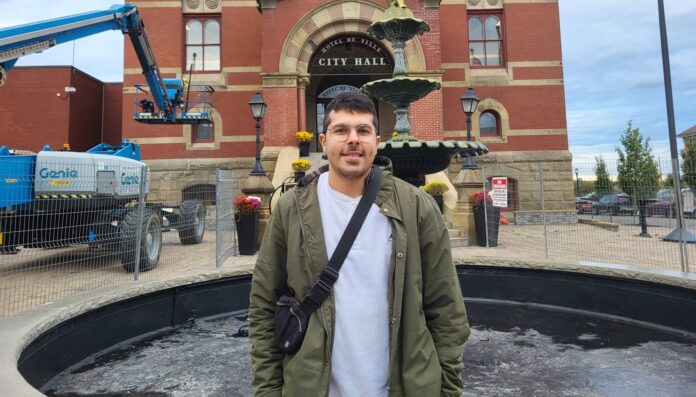
Around 30 people met at Fredericton City Hall on Oct. 10 calling for an end to violence in Palestine and Israel following lethal attacks over the weekend.
Sunni-Islamic militant group Hamas fired thousands of rockets at Israel and sent militants to kill and kidnap people on Oct. 7, including at the Re’im Music Festival. The attack was launched in response to Israeli settler violence and the ongoing occupation of Palestinian territory, according to Mohammed Deif, the leader of Hamas’ military wing.
Hamas is considered a terrorist organization by Canada, the European Union, the United States and other Western allies. It is backed by Iran, Qatar and other countries, as Palestine itself has no standing army to defend itself.
Israel has sent retaliatory airstrikes and has ordered a complete siege of Gaza. Before the events over the weekend, Israel had been accused of “committing the crimes against humanity of apartheid and persecution” by Human Rights Watch. Thousands have been killed in this weekend’s attacks and the conflict has already killed more than 6,400 Palestinians and 300 Israelis since 2008, according to the United Nations.
Amer El-Samman, a poet who often writes about life and love, said this is the first time he has written about resilience in a political context.
“I was born in Lebanon, so I know what it’s like to be under oppressive power,” he said.
His poem, which he read at the vigil, is titled “A land that is not empty is a land that is not empty” and is about Palestinians resisting the ongoing occupation for more than 70 years.
“This is the ground you keep clawing at, the roots remain,” read El-Samman’s poem. “It still has a fight in it, with broken wood and slingshots while you run to the airport.”
UNB mathematics professor Viqar Husain was at City Hall and shared his thoughts about the Israeli-Palestinian conflict. He said the West’s hypocrisy is “nauseating” and the conflict could be stopped if Western powers decided so.
“There is an occupied land and the occupiers are being armed and aided by Western nuclear powers,” he said, noting that to him, the West’s response to the war in Ukraine and the occupation of Palestine is proof of this hypocrisy.
Husain, born in the Indian subcontinent, said he connects to people fighting against colonial power, which is why he came to the vigil. He suggested attendees write to their representatives to make them aware of the Palestinian struggle.
“The civilian cost of life is tragic, everywhere, on all sides and that’s the biggest tragedy of all,” said Husain. “Powerful leaders in the West are sitting, watching it.”
After his speech, Husain asked for a minute of silence for all fallen civilians.
“It’s just sad. It’s disappointing. It’s depressing. It’s horrific.”
Wolastoq Grand Chief Ron Tremblay also spoke to the attendees at the vigil. He said he relates to the Palestinian struggle as he has watched conflicts over “land, resources and religion.”
“After the war is peace, there’s always peace,” said Tremblay. “I don’t know when the human population will be humane.”
Tremblay said colonialism is at the heart of the conflict, claiming lives on all sides. Much like the colonization of the traditional lands of the Wolastoqiyik and other First Nations, he said he empathizes with Palestinians.
“First, it’s a taking of our lands, our resources and squashing our spiritual being, who we are of these lands. We feel for the people. We feel, for we know what that’s like.”
Another pro-Palestine vigil was held at City Hall on Oct. 14, calling for the violence to end.
